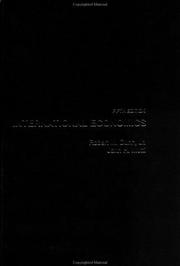| Listing 1 - 4 of 4 |
Sort by
|
Book
Year: 1858 Publisher: London : John Churchill,
Abstract | Keywords | Export | Availability | Bookmark
 Loading...
Loading...Choose an application
- Reference Manager
- EndNote
- RefWorks (Direct export to RefWorks)
The following chapters on Physiological Psychology have appeared as a series of Papers in the "Journal of Psychological Medicine and Mental Pathology," edited by Forbes Winslow, M.D., D.C.L. Written at varying intervals amid the distractions of medical practice, I am sensibly aware that they bear too evident marks of needless repetitions, and of a want of unity in the treatment of the subject; and yet these were perhaps in a measure unavoidable, under the circumstances of their composition. There is reason, however, to believe that these papers have proved a stimulus to thought, and have roused into activity the energy of other minds of high endowments, possessing more leisure and better opportunities than I can command for successfully prosecuting such an interesting inquiry; and this belief has led to their republication in a separate form. Of the importance of the subject, and of its practical bearings upon Psychological Medicine, there can be no dispute, for surely it is on Mental Physiology, and a knowledge of the Correlations of Physiology and Psychology, that a rational and enlightened practice can alone be based. Besides and physiologically or psychologically considered, self-knowledge is equally important. (PsycINFO Database Record (c) 2019 APA, all rights reserved).
Book
ISBN: 1439914613 1439914605 1439914591 Year: 2018 Publisher: Philadelphia, [Pennsylvania] : Temple University Press,
Abstract | Keywords | Export | Availability | Bookmark
 Loading...
Loading...Choose an application
- Reference Manager
- EndNote
- RefWorks (Direct export to RefWorks)
In Toward a Pragmatist Sociology, Robert Dunn explores the relationship between the ideas and principles of philosopher and educator John Dewey and sociologist C. Wright Mills to provide a philosophical and theoretical foundation for the development of a critical and public sociology. Dunn recovers an intellectual and conceptual framework for transforming sociology into a more substantive, comprehensive, and socially useful discipline. Arguing that Dewey and Mills shared a common vision of a relevant, critical, public sociology dedicated to the solution of societal problems, Toward a Pragmatist Sociology investigates the past and present state of the discipline, critiquing its dominant tendencies, and offering historical examples of alternatives to conventional sociological approaches. This original treatment of two influential American thinkers whose work offers a conception of and model for a sociology with public relevance and a sense of moral and political purpose should inspire future sociologists and others to regard the discipline as not only a science but also an intellectual, moral, and political enterprise.
Social sciences. --- Sociology. --- Pragmatism. --- Idealism --- Knowledge, Theory of --- Philosophy --- Philosophy, Modern --- Positivism --- Realism --- Utilitarianism --- Experience --- Reality --- Truth --- Social theory --- Social sciences --- Behavioral sciences --- Human sciences --- Sciences, Social --- Social science --- Social studies --- Civilization --- Dewey, John, --- Mills, C. Wright --- Political and social views. --- Mills, Charles Wright, --- Mills, Raĭt, --- Mills, Charles Wright --- Mīlz, Chārlz Rāīt, --- مياز, چاراز رايت, --- Tu-wei, --- Tu-wei, Yüeh-han, --- Dyui, --- Dʹi︠u︡i, Dzhon, --- Dyuʼi, G'on, --- Дьюи, Джон, --- ديوى، جون، --- 杜威, --- Dīvīy, Jān, --- ديويي، جان --- Dīwʼī, Jān, --- Dīwiʼī, Jān, --- ديوئى، جان --- Diyūʼī, Jān, --- Dyūwi, Jon, --- Dyūi, Jon, --- デューウィジョン, --- デューイジョン, --- ジョン・デューウィ, --- ジョン・デューイ,
Book
Year: 1973 Publisher: Princeton : Princeton University Press,
Abstract | Keywords | Export | Availability | Bookmark
 Loading...
Loading...Choose an application
- Reference Manager
- EndNote
- RefWorks (Direct export to RefWorks)

ISBN: 0415208793 0415208807 9780415208802 Year: 2000 Publisher: London: Routledge,
Abstract | Keywords | Export | Availability | Bookmark
 Loading...
Loading...Choose an application
- Reference Manager
- EndNote
- RefWorks (Direct export to RefWorks)
| Listing 1 - 4 of 4 |
Sort by
|

 Search
Search Feedback
Feedback About UniCat
About UniCat  Help
Help News
News